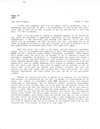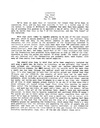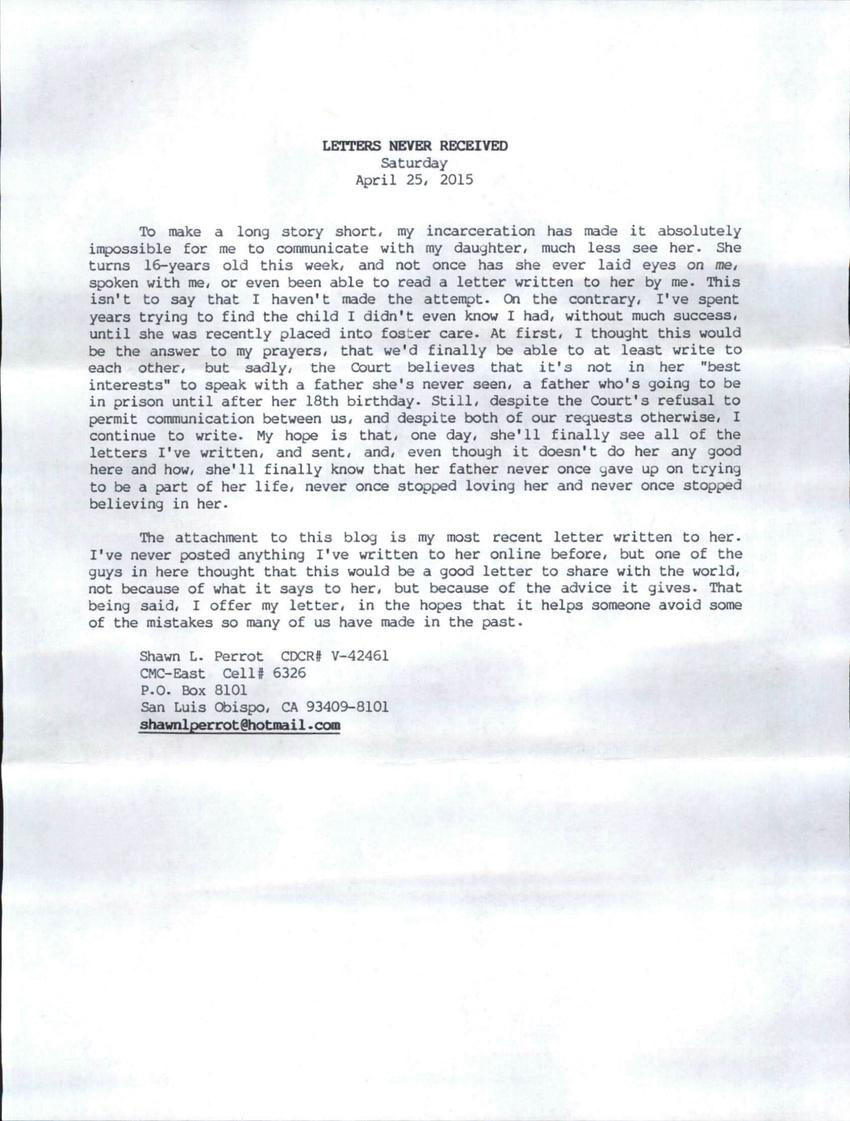
Transcription
Letters Never Received
Saturday
April 25, 2015
To make a long story short, my incarceration has made it absolutely impossible for me to communicate with my daughter, much less see her. She turns 16-years-old this week, and not once has she ever laid eyes on me, spoken with me, or even been able to read a letter written to her by me. This isn't to say that I haven't made the attempt. On the contrary, I've spent years trying to find the child I didn't even know I had, without much success, until she was recently placed into foster care. At first, I thought this would be the answer to my prayers, that we'd finally be able to at least write to each other, but sadly, the Court believes that it's not in her "best interests" to speak with a father she's never seen, a father who's going to be in prison until after her 18th birthday. Still, despite the Court's refusal to permit communication between us, and despite both of our requests otherwise, I continue to write. My hope is that, one day, she'll finally see all of the letters I've written, and sent, and, even though it doesn't do her any good here and now, she'll finally know that her father never once gave up on trying to be a part of her life, never once stopped loving her and never once stopped believing her.
The attachment to this blog is my most recent letter written to her. I've never posted anything I've written to her online before, but one of the guys in here thought that this would be a good letter to share with the world, not because of what it says to her, but because of the advice it gives. That being said, I offer my letter, in the hopes that it helps someone avoid some of the mistakes so many of us have made in the past.
Shawn L. Perrot CDCR# V-42461
CMC-East Cell# 6326
P.O. Box 8101
San Luis Obispo, CA 93409-8101
shawnlperrot@hotmail.com
Other posts by this author
|
2020 aug 12

|
2020 aug 12

|
2020 may 30

|
2020 may 30

|
2020 may 30

|
2020 may 24

|
More... |


Replies (20)
--Calhoun25
--Calhoun25
The case about the volleyball player is inspiring. I like to collect stories like these, to remind people that they can persevere. You might have heard about Charles Krauthammer. He is a neoconservative commentator, who writes columns and frequently goes on television shows. While a student at Harvard Medical, he jumped off a diving board in a bad way. He was left paralyzed from the waist down; he consequently uses a wheel chair. The fascinating thing is, I watched him growing up, and did not discover his injury until years later. He was always confident on air. You would have no reason to suppose he was sitting in a wheelchair. He did not let his injury stop him. President Franklin Roosevelt has a similar story with polio. You could not tell he was in a wheelchair while giving his speeches. One of the most admirable is Stephen Hawking -- his struggles, like FDR's, are very well known. On the other hand, there are many people who are physically fit, and yet mentally destroyed. They take their own lives so early. It's important to pray for our mental and spiritual strength, to enjoy the small things coming our way.
That's all I have for now. At the very least, this latest election cycle has been interesting. I hope it is keeping you occupied in productive thought. Let us know what you think about the 2016 presidential race, if you want to. Take care for now, and write back when you can.
--Calhoun25
“Nothing but hopes and dreams, but hopes and dreams can sometimes be the most powerful forces in the world.” Amen, bro! That sounds like something from the hearts of the world’s most dynamic people.
Dix is a true role model. If I ever stop by Kent State University, I will make sure to check out the stadium. I hope it’s as prodigious in size as he is in strength. I think the comparison between your mom and Dix is a very revealing and humbling one. Thanks for opening up and sharing honestly about that. I’ve met people from the ghettos of Chicago, and they often worry about just what you were talking: people inventing excuses not to work, to remain complacent in their situation. When you live in an impoverished environment, it can be spiritually, emotionally, and even physically draining. At the end of the day, you feel like you don’t have enough energy to escape it. Other people do have that energy, but they are constantly handicapped by environmental, societal, or personal factors. For instance, you might want to go make something of yourself, but you have to expend all your energy caring for your sister’s five children. We definitely need to pray for compassion, grace, energy, and opportunity, both within and without poor communities. We’ve overcome great challenges as a nation: I know we can diminish poverty as well.
Your question about Stephen Hawking is a fantastic one. Sometimes towering intellectuals are very intimidating, even if they are not trying to be so. The complexity and creativity of their ideas can seem to make them immune to common sense critique. Still, if an idea seems somehow flawed, one should press further: nail down the critique in precise language, or with a helpful example. Consider what Mr. Hawking might say in response, and try to amend the objection so as to anticipate his response. After forging such a critique, crafting and tweaking it, one should present it to him in a respectable manner, in which one is more concerned with figuring out the problem than proving someone wrong. I think these things – effort, counter-consideration, respect, and humility – are the right methods for critiquing someone’s theory. Otherwise, one can put off the person they’re critiquing, and rightly so: who wants to respond to the critique of a bitter, disrespectful skeptic? In my personal experience, I’ve found that many bright intellectuals are acutely aware of the possible objections and flaws with their theories. They try to respond as best they can to their skeptics, and (hopefully) have respect for their questioners. Perhaps their responses are convincing to you, perhaps not. It might be that the prominent intellectual and skeptic operate according to different background assumptions. By the way, I would love to hear what you have to say about Hawking’s presentation. I don’t know too much about his theories, but it would still be interesting to hear what you think.
(Continued onto next page)
I think your recommendation for law enforcement is spot-on. It does seem like we have the resources to stop these recent terrorist attacks: we just need to better understand and process the information. Perhaps better computer programs or organizing can help us make sense of the red flags that go up left and right. Plain old experience and discernment is key as well. I’ve heard a big problem in Europe is that the countries don’t have as coordinated an intelligence-gathering community as we do. I remember they were talking about that following the Brussels bombing. The recent tragedy in France is another knife in the heart. We need to pray for protection over all of us – not just the potential terrorist victims, but those who might be easily led to and manipulated by terrorist propaganda.
Finally, I have an article from Thomas Aquinas on property. As you might know, Aquinas is a famous philosopher and theologian from the Middle Ages. He was a Dominican friar living in France. In this article, Aquinas explores whether it is natural and right for a person to possess material things. His famous format is to ask a question, state a couple objections, answer to the contrary, and then respond to the objections. I hope you have fun with this! It’s good to keep the brain active. Take care now.
--Calhoun25
Objection 1. It would seem that it is not natural for man to possess external things. For no man should ascribe to himself that which is God's. Now the dominion over all creatures is proper to God, according to Psalm 23:1, "The earth is the Lord's," etc. Therefore it is not natural for man to possess external things.
Objection 2. Further, Basil in expounding the words of the rich man (Luke 12:18), "I will gather all things that are grown to me, and my goods," says [Hom. in Luc. xii, 18]: "Tell me: which are thine? where did you take them from and bring them into being?" Now whatever man possesses naturally, he can fittingly call his own. Therefore man does not naturally possess external things.
Objection 3. Further, according to Ambrose (De Trin. i [De Fide, ad Gratianum, i, 1) "dominion denotes power." But man has no power over external things, since he can work no change in their nature. Therefore the possession of external things is not natural to man.
On the contrary, It is written (Psalm 8:8): "Thou hast subjected all things under his feet."
I answer that, External things can be considered in two ways. First, as regards their nature, and this is not subject to the power of man, but only to the power of God Whose mere will all things obey. Secondly, as regards their use, and in this way, man has a natural dominion over external things, because, by his reason and will, he is able to use them for his own profit, as they were made on his account: for the imperfect is always for the sake of the perfect, as stated above (Question 64, Article 1). It is by this argument that the Philosopher proves (Polit. i, 3) that the possession of external things is natural to man. Moreover, this natural dominion of man over other creatures, which is competent to man in respect of his reason wherein God's image resides, is shown forth in man's creation (Genesis 1:26) by the words: "Let us make man to our image and likeness: and let him have dominion over the fishes of the sea," etc.
Reply to Objection 1. God has sovereign dominion over all things: and He, according to His providence, directed certain things to the sustenance of man's body. For this reason man has a natural dominion over things, as regards the power to make use of them.
Reply to Objection 2. The rich man is reproved for deeming external things to belong to him principally, as though he had not received them from another, namely from God.
Reply to Objection 3. This argument considers the dominion over external things as regards their nature. Such a dominion belongs to God alone, as stated above.
Thanks for sharing your intriguing thoughts! They gave me a bit to chew over.
I tried looking up that PBS documentary, to get the name. Was it part of the "Take it from Me" series? Anyway, your description of the problem, as illustrated in the documentary, seems spot-on. I have heard most job openings are not in the inner-city; so if one wants to work, she has to spend time and money leaving her neighborhood to (a) find a job, and (b) work there if hired. I had no idea, though, that the distances ranged from 40 to 80 miles (or more)! Apparently, some people drive up to 200 miles each day for work. (This is approximately twice the distance from Chicago to South Bend, IN.) They often work overtime just to afford working – just as you talk about the one lady who lost money going to work.
I wonder whether a feasible solution is igniting local job growth in poor areas. I’ve heard businesses are anxious about opening branches in violent neighborhoods, for fear of robbery. And when businesses are not opening up in these neighborhoods, it becomes more profitable to go into crime. Truly a vicious cycle. Still, I am sure there are people working on jumpstarting local economies. For instance, it is claimed the Obama Library, which is being built in the South Side of Chicago, will help generate healthy business and tourism in its neighborhoods. I am really looking forward to see how it works out.
Given what you said about inmates’ jobs, I decided to look up the federal wage law for correctional facilities. As you probably know, while the federal minimum wage is $7.25 an hour, the maximum inmate wage is $4.73 a day. As you so described: with regard to that pay regime, it’s more beneficial to not work! Being paid well is not only about finances, but also dignity. I know some people are worried about the financial cost of paying inmates more. Why, though, must the state pay from its pocket? Do they not sell inmates’ products on the market, at typical prices? The state doesn’t have to pay out of taxes; it can pay simply according to revenues, like businesses do. I admit, though, I don’t know what is produced at the typical inmate job. What do you think about this market scheme, in case it’s not being used? If it is used, what’s wrong with the current set-up?
I admire your work ethic – you can’t keep a good man down, as they say. It makes the most sense, for your brain, body, and soul, to prepare yourself with skills, such as building databases and reading the law. It’s like building a fortified house. While building it, you are directed in a meaningful project that is good. The building exercises your brain with planning and creativity, your muscles with heavy-lifting, and your soul with focus and forbearance. After you build the house, you have the good of a strong fortress, in case of inclement weather. This manifests assurance and security.
I think you raised a really interesting question along the way: you said it may not be ethical to time travel. That adds a whole new dimension (pun intended) to the discussion! I don’t think I’ve heard it discussed that much, other than the problems associated with changing the present for the worse. I’m sure there are other ethical problems with time travelling – e.g. it might tend to erode self-control, responsibility, and careful thinking, since people might suppose they can just go back to change any negative or reckless consequences. Maybe time travelling is also ethically wrong, in the same way cloning might be: it’s messing with nature in a way that is impermissible. I would like to hear how else you think time travel and ethics are related.
What do you think about Stephen Hawking’s other work in cosmology? He argued that, rather than describing a cone-shaped beginning, the Big Bang characterizes a shuttlecock-shaped (badminton projectile) beginning. In general, what are your thoughts on the Big Bang? Do you think the universe came into being a finite time ago, or did it just exist eternally into the past? If the universe did come into being a finite time ago, does it have a cause of its beginning? How can something come into being without a cause? These questions seem universally (pun not intended) stimulating, since they border upon metaphysics, religion, meaning of life, and the like.
I have no idea how each case of terrorism plays out. But I did read something interesting about the Charleston Shooter case from last summer. Apparently, the shooter should have been denied his gun, since he had been arrested earlier for something. The mistake involved a clerical error of some sort, and a problem with database access, since the arrest happened in a part of town that falls under a different police jurisdiction, than that of the rest. Sometimes these simple, bottom-level errors stymie successful sharing of information. I have the hope that improvement is possible. Speaking of information gathering, I think Gary Johnson believes that the PATRIOT Act was important when it was passed, but that it should have expired by now. I know some people feel very strongly (and in different ways) about the PATRIOT Act.
--Calhoun25
As always, it was a pleasure to read your response. I think your comments on the intellectual powers of inmates are spot-on. I talked to a professor who was running the Civic Knowledge Project (CKP) at the University of Chicago. Recently, CKP teamed up with another organization for the Prison + Neighborhood Arts Project (PNAP). The aim of PNAP is to team up visiting artists and scholars with inmates at Stateville Prison in Illinois. The end of PNAP is to have both visitors and inmates learn from each other, as they collaborate to publish inmates’ poetry, essays, and other arts. It’s pretty high-gear stuff – stimulating and insightful. I hope the program has enough success to spark similar endeavors in prisons nation-wide.
Speaking of intellectual power, I think your philosophical interpretation of the Big Bang is nuanced. I was mulling over your thoughts on G-d’s being. You were saying that G-d Himself came into existence. There are considerate thinkers who hold this position; I personally think a compelling case can be made that G-d never came into being, since He always existed. I would like to talk about it for the rest of this letter, since it is some pretty interesting and heavy stuff. I learned it from other philosophers, so no kudos to me.
The next question is whether G-d Himself is uncaused. Has G-d existed for eternity past, never having come into being, always having been? Or did He come into existence, and so has a cause of His being? If G-d does have a cause, then we can reapply our Causal Question to G-d’s cause: did that cause exist forever, or did it too come into existence, and so have a cause? And if we suppose G-d’s cause itself has a cause, we can still reapply the Causal Question. In fact, it seems we can reapply the Causal Question ad infinitum. You rightly note this: “I don’t believe, for a moment, that this particular Higher Power always was. Something had to create Him (or Her, whatever your preference might be), so who was it? And what created that Power? And so on and so forth…” So, if we can always reapply the Causal Question, then there exists an actual infinity – namely, an actually infinite causal chain that ends with the creation of the universe.
Let’s restart: suppose you have an infinite number of our labeled coins. If you take away all the odd-numbered coins, you have taken away an infinite amount of coins. And you have an infinite number of coins remaining – namely, all the even-numbered coins. (There are an infinite number of odd and even numbers.) So, you have an infinite number of coins, take away an infinite number of coins, and are left with an infinite number of coins.
It seems, though, that we have a metaphysical absurdity here. In each of the two cases, you started with the same number of coins (an infinite number), and took away the same number of coins (an infinite number); yet you were left with a different amount of coins in each case (three in the first case, an infinite number in the second). Though there may not be any logical contradictions here, there surely seems something metaphysically absurd – absurd enough to discredit, or at least make you agnostic about, the existence of an actually infinite number of things.
Now, if we assume an actually infinite number of things is possible, then it is possible to have time extend infinitely backwards. Let us suppose Planets A and B have been revolving around their sun from infinity backwards to the present. If we measure, in the present, each planet’s number of revolutions, then each has revolved an infinite number of times. In other words, each planet has revolved the same number of times. This is true, even though Planet A revolves twice as fast as Planet B, and on that account should have done more revolutions than Planet B! Again, though this might not be a strict logical inconsistency, it nevertheless amounts to some sort of metaphysical absurdity, something a normal person may doubt, or even reject on the basis of real-life experience.
In sum, if there is an actually infinite number of things, then it seems such an existence would lead to metaphysical absurdities of the kinds described. And it seems such metaphysical absurdities cannot occur. Of course, there are plenty of considerate and thoughtful people who believe that there is an actually infinite number of things. I leave it to you to judge the persuasive force of these points.
Alright, that’s all for now. I hope it’s not too cold where you’re at. Parts of the Midwest are starting to get their first serious freezing. Take care now, and have a pleasant evening.
Peace,
Calhoun25